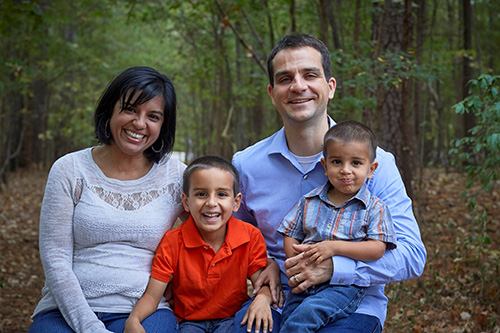
This week’s Faculty Spotlight shines on primary care specialist Rushina Cholera, MD, PhD. Cholera talks to us about how she joined Duke’s first cohort of National Clinician Scholars to experience a rigorous, mentored experience that would allow her to hone the research skill set she had developed during her PhD in epidemiology, how she became interested in pediatric primary care, her interests in the social needs of children in immigrant and refugee families, and her reflections on her relationships with her mentors, students, and patients.
How long have you been at Duke? How did you decide to come here?
I’ve been at Duke since July 2019. I joined Duke’s first cohort of National Clinician Scholars, a 2-year program focused around training clinicians to conduct robust, policy-relevant research through a health equity lens. After finishing my residency, I was looking for a rigorous, mentored experience that would allow me to hone the research skill set I had developed during my PhD in Epidemiology and gain further expertise in understanding and addressing social drivers of health among young children, particularly children in immigrant families. I interviewed at several NCSP sites but immediately felt at home at Duke!
What were your pre-COVID responsibilities at Duke? What did a typical day for look like?
My days vary quite a bit--which keeps it interesting! I spend about 80% of my time working on team-based multidisciplinary research studies. My work ranges from using large datasets to understand the impacts of immigration policy on child health outcomes, to developing equitable social drivers screening and intervention approaches for immigrant families. I’m also a team leader for a BASS connections project, so I get to spend a day every week working with a group of stellar undergraduates to develop policy recommendations for the state of NC around implementation of the NC Early Childhood Action Plan. For my clinical work, I spend one day a week either taking care of newborns in the Duke Regional Nursery or in the same-day clinic at our Roxboro Road clinic.
How has the COVID-19 pandemic affected your work? What’s one strategy you and your colleagues have used to adapt or compensate?
The pandemic has brought a new urgency to rapidly translating decades of research on health disparities and social determinants of health into practical, systems-level change that can improve health equity. Many of my colleagues and I have shifted our work to contribute to these needs and use our skill sets in a way that might be helpful and meaningful in this time.
How and when did you initially become interested in pediatrics and pediatric primary care in particular?
Not until my pediatrics clerkship as a medical student! After my PhD in infectious disease epidemiology, I thought I would do adult ID. But, I quickly realized I loved talking with families and having the privilege to walk with them through all the large and small transitions to parenthood and beyond.
You and Emily Esmaili, DO, MA, recently received a one-year grant from the North Carolina Healthcare Association (NCHA) – can you tell us what this funding will support?
This grant is part of the COVID-19 Fill the Gap Response Fund which is meant to rapidly meet critical needs not being addressed through state or federal funds. This funding will support the development and implementation of a targeted proactive outreach and care coordination program to identify and address the social needs of children in immigrant and refugee families at Lincoln Community Health Center.
What do you enjoy most about your work?
The relationships with my coworkers, my mentors, my students, and my patients. I am lucky to have found great collaborators and colleagues to work with as well as an amazing group of multidisciplinary mentors. I have also been amazed by the Duke students and residents who keep me inspired and motivated. And, every week my patients keep me humble, grounded, and remind me why we do what we do.

How has the epidemic affected your life outside of Duke? What’s one positive strategy or resource you’ve found that helps you cope?
The biggest changes have been with adjusting to school and daycare closures for my two sons, Kian (6.5) and Nico (nearly 3). My partner is an emergency medicine physician, so we have also had many emotional roller coasters with trying to navigate safety, exposure to family members, and all the things we are all figuring out as a community right now. I’ve been much more careful with prioritizing and being intentional about spending my time on the work or relationships that feel most meaningful.
What passions or hobbies do you have outside of Duke?
I love spending time outside with my family and our two dogs. We are lucky to live in a very bike friendly community that borders nearly 500 acres of forest and trails so we spend much of our free time exploring outside.